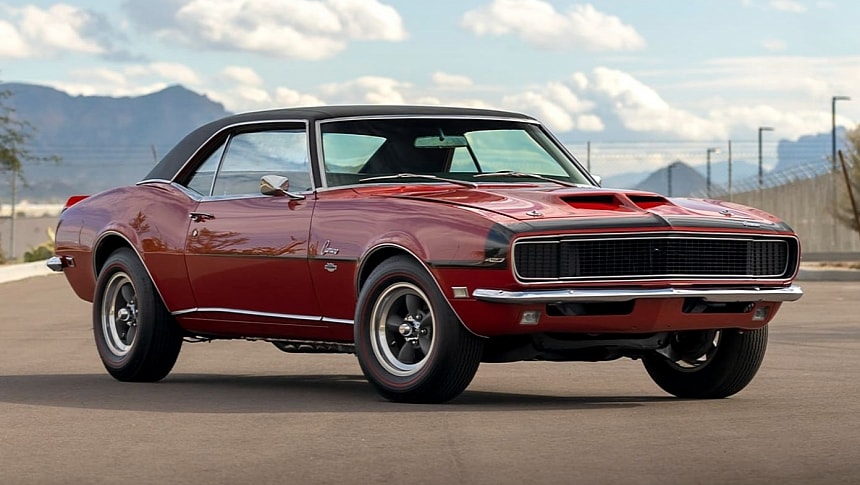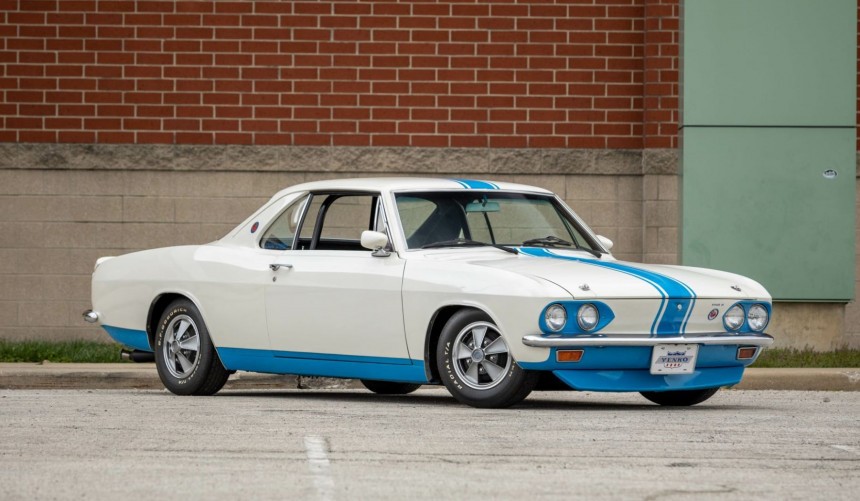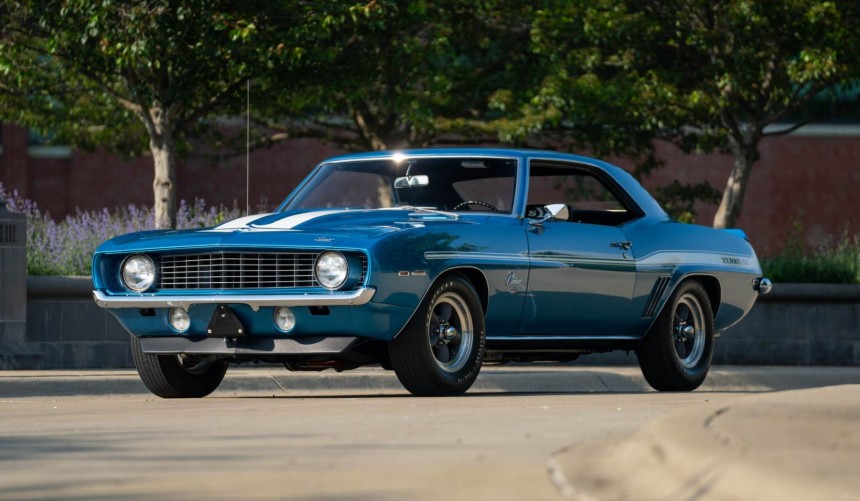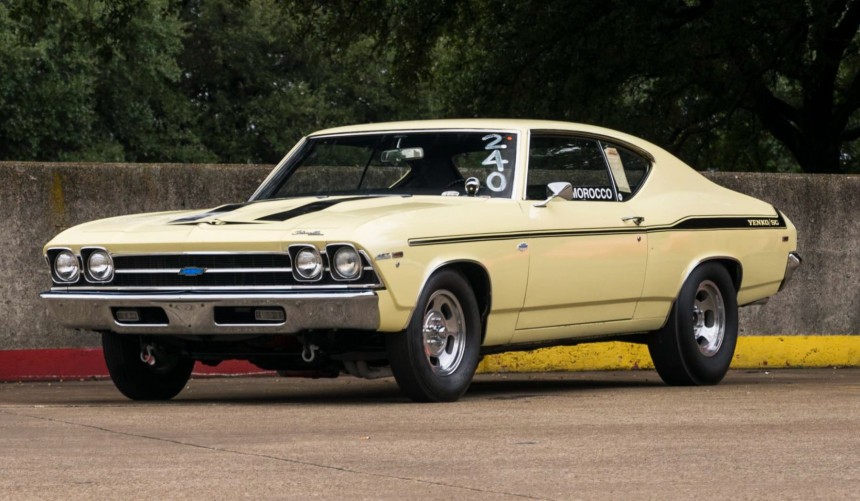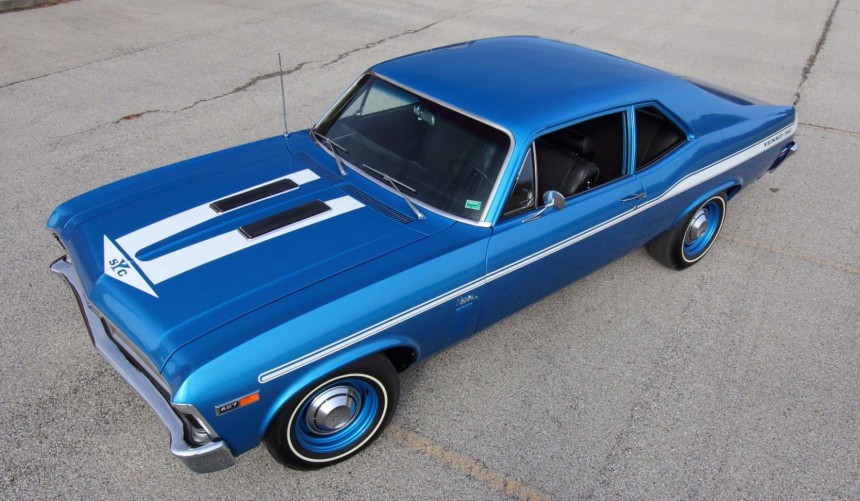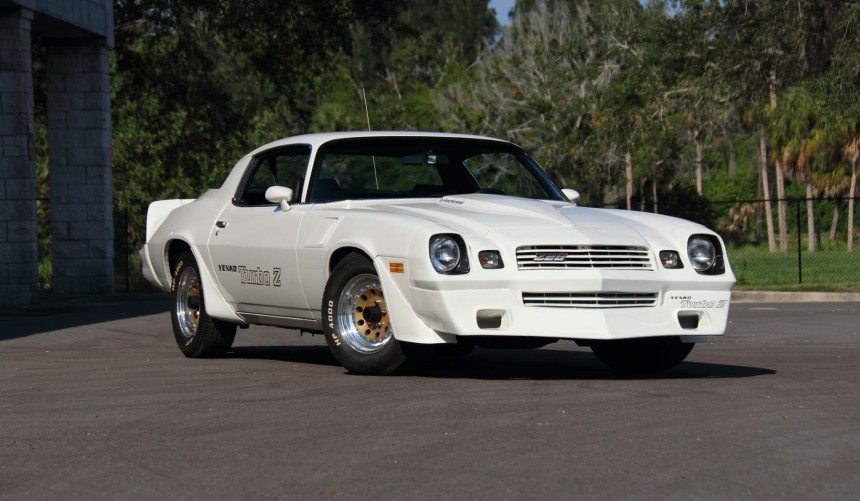Based on popular factory-built Chevys, these five mean machines became muscle car legends thanks to the performance makeover they got at the hands of Don Yenko and his crew.
Founded in 1949 in Canonsburg, Pennsylvania, Yenko Chevrolet was one of two Pennsylvania-based dealerships owned by Frank Yenko.
It remained a dealership like any other until 1957, when Frank's son, Don, took over. A performance enthusiast, self-taught engineer, and race driver, Don Yenko soon turned the dealership into ground zero for Chevrolet performance.
During the 1960s, Yenko modified stock Chevys into street and drag strip legends, built his own Corvair-based homologation special, and solidified his place into the proverbial muscle car Hall of Fame.
Apart from successfully managing his dealership, Don Yenko was a race driver and team owner, with two Sports Car Club of America (SCCA) national titles to his name. Still, by 1965, he was getting his behind whooped by close friend Carroll Shelby and his Mustangs.
For the 1966 season, he decided to compete in the D Production class with a modified Chevrolet Corvair. However, to homologate the extensive upgrades, Yenko had to build a minimum of 100 examples.
Thus, in just one month, 100 Corvair Corsas became Yenko Stingers, thanks to Don and his crew's determination to work from dusk to dawn.
Each Stinger received an extensive weight-saving makeover, with several components being removed or replaced with lightweight versions.
Furthermore, the Corvair's fully independent suspension was improved with better shocks and springs, while the air-cooled flat-six also received extensive tuning.
Customers could have a Stinger in one of four performance setups, ranging from the 160-hp Stage I to the 240-hp, track-only Stage IV.
Though it was not a muscle car, the Stinger was an excellent high-performance Chevy that brought Yenko's Jerry Thompson a national title in 1967, and paved the way for the following tire-shredding supercars.
When Chevrolet revealed its Mustang-rivaling pony car, Don Yenko decided to transform it into an outrageous supercar.
GM prevented Chevy from offering a V8 larger than 400 cubic inches (6.5 liters) in the Camaro to prevent it from cutting into Corvette sales.
However, Yenko didn't have to abide by GM's rules, so he ordered 54 L-72 427-ci (7.0-liter) Corvette engines and swapped them inside 54 SS-spec Camaros.
Apart from the potent V8s, conservatively rated at 450 hp, Yenko tuned the heavy-duty suspension setup and added fiberglass hoods.
The Yenko SC/Camaro or Super Camaro became one of the fastest, most fearsome muscle cars of the era.
Yenko produced 64 additional Super Camaros in 1968, albeit with extra refinements like suspension and brake upgrades, a new fiberglass hood design, Pontiac wheels, a factory RS appearance package, and distinct Yenko logos.
For the 1969 model year, the Super Camaros no longer received engine swaps in the Yenko shop but were assembled with 427s and all the additional hardware from the factory, courtesy of the Central Office Production Order (COPO) system. Available with an updated decal package, the 1969 SYC (Yenko Super Car) Camaro was built in201 units.
With the Super Camaro becoming a resounding success, Don Yenko decided to expand his supercar lineup in 1969.
One of the two new models was the Yenko Chevelle. Like the Super Camaro, the intermediate was ordered through the COPO program with a host of special components.
The base cars were SS Chevelles that received 425-hp L-72s, 427 V8s, and 12-bolt rear ends with a choice of three special gear ratios. Apart from that, the Chevelles used unmodified factory stock SS components for the suspension, steering, and braking systems.
Appearance-wise, the Yenko Chevelles received a special decal package, and the SYC logos were imprinted on the front seat headrests.
Only 99 SYC Chevelles were sold by Yenko during the 1969 model year.
The second model added to the 1969 Yenko lineup was the compact Nova.
But, unlike its 1969 Camaro and Chevelle siblings, the Super Nova was ordered in factory SS spec, equipped with the 375-hp 396-ci (6.5-liter) big-block V8.
Each of the 37 units built (38, including an automatic-equipped prototype) had their original engines removed and replaced with L-72 427s, transforming them into the wildest cars Yenko had ever sold.
Able to accelerate to 60 mph (97 kph) from a standstill in the 5.5 to 6-second range, the 1969 SYC Nova was a lethal combination of a relatively lightweight, compact chassis and an insanely powerful engine.
With insurance premiums on the rise in 1970, Yenko stopped selling its SYC Camaro and Chevelle, making only the Nova available.
However, this new Super Nova, dubbed Yenko Deuce, was now ordered through the COPO system with the new 360 hp 350-ci (5.7-liter) LT-1 small-block V8 that Chevy offered in the 1970 Corvette and Camaro Z28.
Though not as outrageous as the 1969 Super Nova, the Deuce was still a force to be reckoned with on the street and the drag strip.
Twelve years after the last Super Camaro left the Yenko dealership, a new one debuted for the 1981 model year.
Called Turbo Z and based on the second-generation Z28 of 1981, the Turbo Z was a pleasant surprise for high-performance enthusiasts during an era when high-horsepower machines were a thing of the past.
Similar to the 1996 Stinger, the Turbo Z was available with one of two performance packages. The first, dubbed Stage I, increased the 350 small-block V8s output from the stock 175 hp to 250 hp with the addition of a 7-psi turbocharger.
Apart from the forced induction system, the package also included a special scooped hood and Turbo Z side decals.
For those who wanted an even more performance-focused Yenko Camaro, Stage II added Koni adjustable shocks, Guldstrand polyurethane bushings, lightweight Weld two-piece wheels, Kamp leather seats, and a Racemark steering wheel.
Yenko built a mere 19 Turbo Zs, of which only three got the insanely expensive Stage II package.
Despite being the rarest Yenko car in existence, the Turbo Z Stage II isn't as expensive as you would think these days. The highly original example shown above recently sold at a Mecum auction for $66,000.
It remained a dealership like any other until 1957, when Frank's son, Don, took over. A performance enthusiast, self-taught engineer, and race driver, Don Yenko soon turned the dealership into ground zero for Chevrolet performance.
During the 1960s, Yenko modified stock Chevys into street and drag strip legends, built his own Corvair-based homologation special, and solidified his place into the proverbial muscle car Hall of Fame.
1966 Yenko Stinger
For the 1966 season, he decided to compete in the D Production class with a modified Chevrolet Corvair. However, to homologate the extensive upgrades, Yenko had to build a minimum of 100 examples.
Thus, in just one month, 100 Corvair Corsas became Yenko Stingers, thanks to Don and his crew's determination to work from dusk to dawn.
Each Stinger received an extensive weight-saving makeover, with several components being removed or replaced with lightweight versions.
Furthermore, the Corvair's fully independent suspension was improved with better shocks and springs, while the air-cooled flat-six also received extensive tuning.
Customers could have a Stinger in one of four performance setups, ranging from the 160-hp Stage I to the 240-hp, track-only Stage IV.
Though it was not a muscle car, the Stinger was an excellent high-performance Chevy that brought Yenko's Jerry Thompson a national title in 1967, and paved the way for the following tire-shredding supercars.
1967-1969 Yenko Camaro
GM prevented Chevy from offering a V8 larger than 400 cubic inches (6.5 liters) in the Camaro to prevent it from cutting into Corvette sales.
However, Yenko didn't have to abide by GM's rules, so he ordered 54 L-72 427-ci (7.0-liter) Corvette engines and swapped them inside 54 SS-spec Camaros.
Apart from the potent V8s, conservatively rated at 450 hp, Yenko tuned the heavy-duty suspension setup and added fiberglass hoods.
The Yenko SC/Camaro or Super Camaro became one of the fastest, most fearsome muscle cars of the era.
Yenko produced 64 additional Super Camaros in 1968, albeit with extra refinements like suspension and brake upgrades, a new fiberglass hood design, Pontiac wheels, a factory RS appearance package, and distinct Yenko logos.
For the 1969 model year, the Super Camaros no longer received engine swaps in the Yenko shop but were assembled with 427s and all the additional hardware from the factory, courtesy of the Central Office Production Order (COPO) system. Available with an updated decal package, the 1969 SYC (Yenko Super Car) Camaro was built in201 units.
1969 Yenko Chevelle
One of the two new models was the Yenko Chevelle. Like the Super Camaro, the intermediate was ordered through the COPO program with a host of special components.
The base cars were SS Chevelles that received 425-hp L-72s, 427 V8s, and 12-bolt rear ends with a choice of three special gear ratios. Apart from that, the Chevelles used unmodified factory stock SS components for the suspension, steering, and braking systems.
Appearance-wise, the Yenko Chevelles received a special decal package, and the SYC logos were imprinted on the front seat headrests.
Only 99 SYC Chevelles were sold by Yenko during the 1969 model year.
1969 Yenko Nova and 1970 Yenko Deuce
But, unlike its 1969 Camaro and Chevelle siblings, the Super Nova was ordered in factory SS spec, equipped with the 375-hp 396-ci (6.5-liter) big-block V8.
Each of the 37 units built (38, including an automatic-equipped prototype) had their original engines removed and replaced with L-72 427s, transforming them into the wildest cars Yenko had ever sold.
Able to accelerate to 60 mph (97 kph) from a standstill in the 5.5 to 6-second range, the 1969 SYC Nova was a lethal combination of a relatively lightweight, compact chassis and an insanely powerful engine.
With insurance premiums on the rise in 1970, Yenko stopped selling its SYC Camaro and Chevelle, making only the Nova available.
However, this new Super Nova, dubbed Yenko Deuce, was now ordered through the COPO system with the new 360 hp 350-ci (5.7-liter) LT-1 small-block V8 that Chevy offered in the 1970 Corvette and Camaro Z28.
Though not as outrageous as the 1969 Super Nova, the Deuce was still a force to be reckoned with on the street and the drag strip.
1981 Yenko Camaro Turbo Z
Called Turbo Z and based on the second-generation Z28 of 1981, the Turbo Z was a pleasant surprise for high-performance enthusiasts during an era when high-horsepower machines were a thing of the past.
Similar to the 1996 Stinger, the Turbo Z was available with one of two performance packages. The first, dubbed Stage I, increased the 350 small-block V8s output from the stock 175 hp to 250 hp with the addition of a 7-psi turbocharger.
Apart from the forced induction system, the package also included a special scooped hood and Turbo Z side decals.
For those who wanted an even more performance-focused Yenko Camaro, Stage II added Koni adjustable shocks, Guldstrand polyurethane bushings, lightweight Weld two-piece wheels, Kamp leather seats, and a Racemark steering wheel.
Yenko built a mere 19 Turbo Zs, of which only three got the insanely expensive Stage II package.
Despite being the rarest Yenko car in existence, the Turbo Z Stage II isn't as expensive as you would think these days. The highly original example shown above recently sold at a Mecum auction for $66,000.
